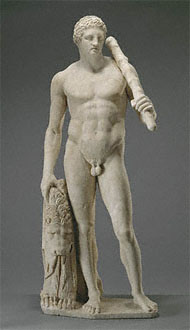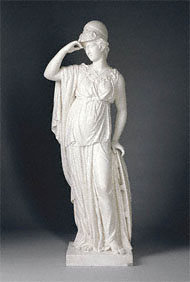The term "myth" refers to a story that attempts in more or less symbolic form to explain the mystery of the origins of the cosmos, the earth, and humanity; the theme of life and death; and the causes and meanings of natural phenomena. All of these have bewildered humanity since ancient times. Humankind uses myth as an attempt to express its relation to nature.
Originally, these stories were passed down orally from one generation to the next and, over a span of several centuries, underwent many changes. The ancient world attributed the Iliad and the Odyssey—two epics considered the earliest and greatest works of Greek literature—to Homer. Homer is believed to have been the first poet to record these myths into written form, in approximately the eighth century B.C., thereby preserving them for future generations.

|
||
Many generations and peoples after Homer have continued to look at these stories because they address issues common to humanity. These tales were told to explain the surrounding world, human behavior, and problems common to all societies. In addition to explaining natural and religious origins, myths also provided humans with a history of their people and their neighbors. For the Greeks, myths shed light on aspects of their lives and how they had become who they were.
The materials in this curriculum focus on Greco-Roman mythology in antiquity and its significance for later Western art and culture. There was a fundamental difference in attitudes toward mythology during these two periods. Whereas in antiquity mythology was inextricably linked with religion and daily life, in post-antiquity, mythology primarily became a source of inspiration for a variety of themes in art and literature. The diversity and universality of these themes, combined with the inexhaustible metaphorical possibilities of the ancient myths, ensure the survival of mythology in Western art up to the present day.
Heroes
The idea of the hero was perfected in ancient Greece. For the Greeks, heroes existed on a cosmological level between humans and gods. According to the poet Hesiod, heroes were a godlike race of humans who had lived in a previous age. Although they themselves were mortal, the heroes attracted the attention, and often the protection of, the immortals. In another tradition, heroes emerged when gods and men were still living together as a generation of children of half-mortal, half-divine parentage.

|
||
In their strength, their passions, and their achievements, the heroes far surpassed ordinary humans. All heroes are nevertheless mortal and in time confront their mortality. Yet even in death a hero may surpass ordinary peoples, for the glorious deeds that have brought him to his death may also bring him everlasting renown. Some, like the great hero Herakles (whom the Romans called Hercules), actually became gods after death. In ancient Greece, heroes had religious cults associated with them and were able to intervene in human affairs, possessing a status similar to that of saints in Christianity. Over the centuries, the definition of a hero broadened to include any human who displayed great strength and courage.
Gods
Gods and goddesses of ancient Greece and Rome have provided the subject matter for much of Western art. For the Greeks, there were 12 main deities (all related to one another) who lived on Mount Olympus, where they observed the progress of mortals. Aside from these major gods, the universe was filled with innumerable minor deities. The Romans, in turn, merged many of their native gods with those of the Greeks.

|
||
Since antiquity, stories of the ancient gods and goddesses, such as Zeus, Aphrodite, and her son Eros, continued to be depicted, even while they had lost their religious significance. In the Renaissance, a classical education was required of all learned gentlemen; knowledge of Greece and Rome demonstrated one's knowledge, taste, and status. A universal language of images was reborn, but often with new allegorical and intellectual meanings.